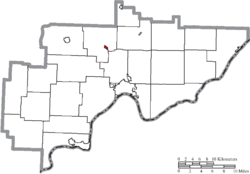Lowell, Ohio
| Lowell, Ohio | |
|---|---|
| Village | |
 Location of Lowell, Ohio |
|
 Location of Lowell in Washington County |
|
| Coordinates: 39°31′45″N 81°30′27″W / 39.52917°N 81.50750°WCoordinates: 39°31′45″N 81°30′27″W / 39.52917°N 81.50750°W | |
| Country | United States |
| State | Ohio |
| County | Washington |
| Government | |
| • Type | Mayor-council |
| • Mayor | David Pitzer |
| Area | |
| • Total | 0.24 sq mi (0.62 km2) |
| • Land | 0.23 sq mi (0.60 km2) |
| • Water | 0.01 sq mi (0.03 km2) |
| Elevation | 617 ft (188 m) |
| Population (2010) | |
| • Total | 549 |
| • Estimate (2012) | 553 |
| • Density | 2,387.0/sq mi (921.6/km2) |
| Time zone | Eastern (EST) (UTC-5) |
| • Summer (DST) | EDT (UTC-4) |
| ZIP code | 45744 |
| Area code(s) | 740 |
| FIPS code | 39-45164 |
| GNIS feature ID | 1065718 |
Lowell is a village in Washington County, Ohio, United States, along the Muskingum River. The population was 549 at the 2010 census.
The first European settlers to the land that would become Lowell arrived in the late 18th century after the 1787 Northwest Ordinance opened the territory for settlement. Soon after the Ordinance took effect, the Ohio Company of Associates purchased 1,500,000 acres (6,100 km2) of land along the Muskingum River and proceeded to survey the area. The first settlement in what would become the state of Ohio was Marietta, founded in 1788 near the mouth of the Muskingum about 14 miles (23 km) downstream from the site that would become Lowell. By 1789, settlement had spread north to the area where the Cats Creek enters the Muskingum River.
By the 1830s the Muskingum Valley had long been settled, and local leaders created a plan to improve the Muskingum River for use as a source of power. In 1836 the State Legislature approved a bill that appropriated $400,000 to create a series of locks and dams along the river as far north as Dresden. Between 1837 and 1841, eleven dams and twelve locks were built at a cost that had ballooned to over $1.6 million. The third lock was built within a one-mile (1.6 km) long canal constructed near the mouth of the Cats Creek to bypass a series of rapids in the Muskingum. Two competing companies bought land near the canal with the intentions of building a town. The first settlement was laid out on November 8, 1837 and was named Lowell with the idea that it would grow into a large manufacturing city similar to Lowell, Massachusetts. It was located along the upper end of the canal on the west side of the Cats Creek. The second settlement, called Buell's Lowell, was laid out on March 22, 1838. The second settlement quickly grew to dominate to the point that the first settlement became known as Upper Lowell. In 1850, Buell's Lowell was incorporated as a village and in 1889 officially changed its name to Lowell.
...
Wikipedia
